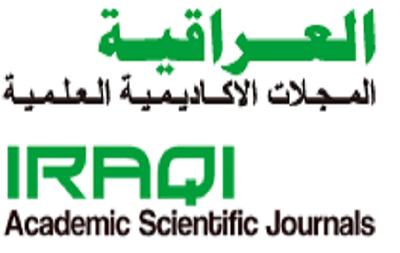الذكاء الاصطناعي ودوره في تحقيق التميز الاداري لمنتسبي كلية التربية البدنية وعلوم الرياضة في جامعة الموصل
محتوى المقالة الرئيسي
الملخص
هدفت البحث الى تطبيق مقياس الذكاء الاصطناعي على منتسبي كلية التربية البدنية وعلوم الرياضة في جامعة الموصل. استخدم الباحثون المنهج الوصفي لملائمته طبيعة البحث، اما عينة البحث فقد تكونت من منتسبي كلية التربية البدنية وعلوم الرياضة في جامعة الموصل، تم استخدام استبانة تطبيقات الذكاء الاصطناعي والمعدة من قبل (ابتسام عبد الحميد 2021) والمكون من (33) فقرة توزعت على اربعة ابعاد، وتم استخدام تحليل ليكرت الثلاثي في معالجة البيانات. وكانت اهم النتائج التي توصل اليها الباحثون ان استخدام تطبيقات الذكاء الاصطناعي تساعد على التفاعل التعليمي من المتعلم من ناحية ومصادر التعليم من ناحية اخرى بما في ذلك الكتب والادوات والوسائل التعليمية المختلفة واوصى الاستفادة من تطبيقات الذكاء الاصطناعي قدر الامكان في عمليات التعليم والتعليم وفي ادارة الانشطة في الكلية.
تفاصيل المقالة

هذا العمل مرخص بموجب Creative Commons Attribution-NonCommercial 4.0 International License.
المراجع
Abdul-Hafiz, B. M. (2000). Methods of research and statistical analysis in the educational, psychological and sports fields (p. 97). Kitab Center for Publishing.
Abu Al-Saud, M. S. (2023). Contributions of administrative applications of artificial intelligence in achieving institutional excellence in sports institutions. Scientific Journal of Physical Education and Sports Sciences, Helwan University, 2(98), 157–0. https://doi.org/10.21608/jsbsh.2023.188142.2356
Abu Bakr, K. (2017). Artificial Intelligence Applications in the Service of Arab Banks. Journal of Financial and Banking Studies, Arab Academy for Banking and Financial Sciences, 25(2), 58.
Adel, O. J. A. (2019). The possibility of using artificial intelligence techniques in controlling the quality of internal auditing. The Eleventh Annual Scientific Conference, Al-Zaytouna University.
Ajam, I. M. H. (2018). Artificial Intelligence and its Impact on High-Performance Organizations: A Survey Study in the Ministry of Science and Technology. Journal of Administration and Economics, 115, 88–102. https://admics.uomustansiriyah.edu.iq/index.php/admeco/article/view/616
Al-Ali, A. S. et al. (2009). Introduction to Knowledge Management (p. 198). Dar Al-Masirah for Publishing, Distribution and Printing.
Al-Asttal, M. Z., Aql, M. S., & Agha, I. M. (2021). Developing a proposed model based on artificial intelligence and its effectiveness in developing programming skills among students of the University College of Science and Technology in Khan Yunis. Journal of the Islamic University for Educational and Psychological Studies, 29(2).
Al-Azzam, N. M. A. (2020). The role of artificial intelligence in raising the efficiency of administrative systems for human resources management at Tabuk University. Educational Journal, Faculty of Education, Sohag University, 1(1), 15.
Al-Dessouki, D. M. (2019). The Role of Artificial Intelligence and Its Various Applications in Risk and Crisis Management, Twenty-Fourth Annual Conference. Journal of Accounting Thought, Faculty of Commerce, Ain Shams University, 4(2), 5.
Al-Habsi, S. bin S. bin M. (2021). The Role of Leadership in Spreading the Culture of Excellence and Its Impact on Achieving Institutional Excellence: An Applied Study on Al-Itqan Engineering Consulting Company in the Sultanate of Oman. Scientific Journal of Financial and Commercial Studies and Research, 2(2), 553–579. https://doi.org/10.21608/cfdj.2021.171156
Ali, I. A. H. A. (2021). The role of artificial intelligence applications in developing the performance of some sports institutions in the State of Kuwait. Journal of Sports Science Applications, Alexandria University, Abu Qir, 2(110).
Al-Salmi, A. A.-R. (2015). Decision Support Systems (p. 29). Wael Publishing House.
Al-Yaziji, F. H. (2019). Using Artificial Intelligence Applications to Support University Education in the Kingdom of Saudi Arabia. Arab Educators Association, 113.
Atiya, A. A.-S. H., & Moseekh, L. Z. (2023). The role of the organizational climate for workers in volleyball sports federations in Iraq. Kufa Journal Physical Education Sciences, 2(6).
Azmy, N. G., Ismail, A. R. M., & Mobarez, M. A. A. (2014). The effectiveness of an electronic learning environment based on artificial intelligence to solve computer network maintenance problems for educational technology students. Arab Society for Educational Technology, 241.
Bargarai, F., Abdulazeez, A., Tiryaki, V., & Zeebaree, D. (2020). Management of wireless communication systems using artificial intelligence-based software defined radio.
Bitkina, O. V., Jeong, H., Lee, B. C., Park, J., Park, J., & Kim, H. K. (2020). Perceived trust in artificial intelligence technologies: A preliminary study. Human Factors and Ergonomics in Manufacturing & Service Industries, 30(4), 282–290.
Chang, W.-Y. (2019). A data envelopment analysis on the performance of using artificial intelligence-based environmental management systems in the convention and exhibition industry. Ekoloji Dergisi, 107.
Davenport, T., Guha, A., Grewal, D., & Bressgott, T. (2020). How artificial intelligence will change the future of marketing. Journal of the Academy of Marketing Science, 48, 24–42.
de Bellis, E., & Venkataramani Johar, G. (2020). Autonomous Shopping Systems: Identifying and Overcoming Barriers to Consumer Adoption. Journal of Retailing, 96(1), 74–87. https://doi.org/10.1016/j.jretai.2019.12.004
Greenman, C. (2017). Exploring the impact of artificial intelligence on the accounting profession. Journal of Research in Business, Economics and Management, 8(3), 1451. https://commons.erau.edu/publication/826
Lisboa, P. J., & Taktak, A. F. G. (2006). The use of artificial neural networks in decision support in cancer: a systematic review. Neural Networks, 19(4), 408–415.
Muhammad Ibrahim Brik, A. (2020). Communicators’ Attitudes Towards the Use of Artificial Intelligence Technologies in Egyptian and Saudi Press Institutions: A Field Study Within the Framework of the Unified Theory of Acceptance and Use of Technology. Journal of Media Research, 53(2), 447–526. https://doi.org/10.21608/jsb.2020.97509
Odeh, A. Y., Shabib, S. S., Ghazi, M. A., & Mohammed, L. H. (2024). Developing physical education curricula in the age of artificial intelligence. Journal of Sports Education Studies and Research, 34(3), 37–56. DOI: https://doi.org/10.55998/jsrse.v34i3.687
Oudah, A., Abbood, R., Shabib, S., Aldewan, L., & Ghazi, M. (2024). Developing Physical Education Curricula Within the Framework of Digital Transformation to Achieve Sustainable Development. Teacher Education and Curriculum Studies, 9(3), 86–102. https://doi.org/10.11648/j.tecs.20240903.15
Raqiq, A. (2015). Using Artificial Intelligence Applications in Managing the Activities of Economic Institutions [Master’s Thesis]. University of Oum El Bouaghi.
Shrestha, Y. R., Ben-Menahem, S. M., & von Krogh, G. (2019). Organizational Decision-Making Structures in the Age of Artificial Intelligence. California Management Review, 61(4), 66–83. https://doi.org/10.1177/0008125619862257
Zafer, Z. H. (2019). The effect of using an artificial intelligence chatbot to develop cognitive aspects in science for primary school female students. Saudi Journal of Educational Sciences, 64, 10.
Zamrir, M., & Al-Fayous, M. (2015). Information Technology Systems Management (p. 400). United Arab Company for Marketing and Supplies.





 IASJ
IASJ CC-BY-4.0
CC-BY-4.0 turnitin
turnitin ISSN
ISSN DOAJ
DOAJ Crossref
Crossref GoogleScholar
GoogleScholar Orcid
Orcid